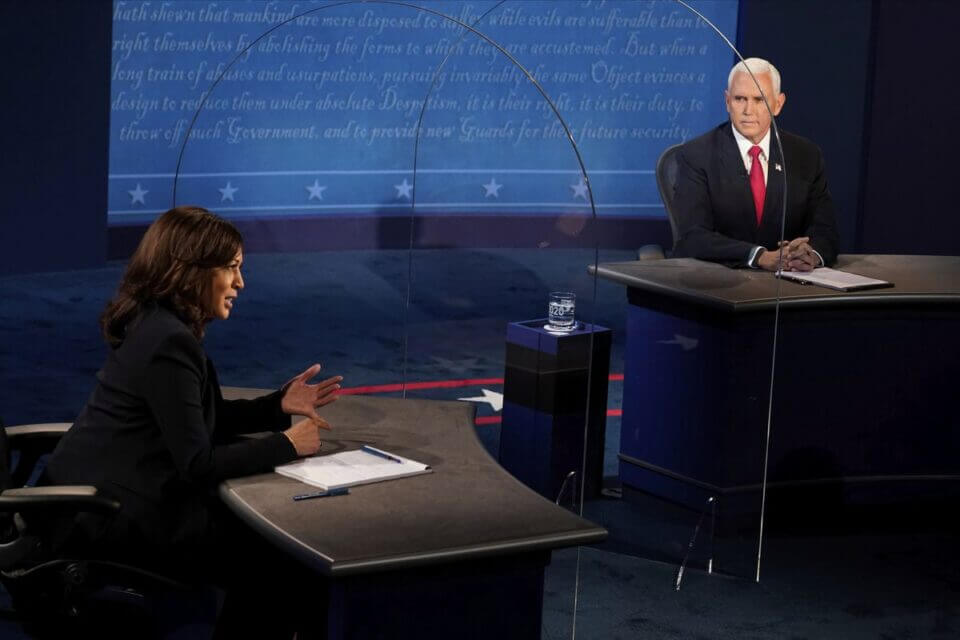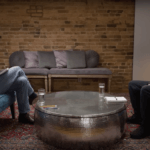
“These were not typical evasions regarding policies; they were evasions regarding principles.”
Many political commentators are correctly hailing Wednesday’s Vice Presidential debate between Vice President Mike Pence and Senator Kamala Harris as a “throwback.” In many ways, it was. It seemed like a fairly standard, pre-Trump, Democrat vs. Republican debate as the candidates routinely exceeded their allotted speaking times, did not interrupt one another much, and focused their messaging on typical wedge issues such as taxes, abortion, health care, and climate policy. All the while, both Vice President Pence and Senator Harris evaded a great deal of questions, opting for talking points rather than direct answers. This too was a form of conventional, pre-Trump status quo politicking.
But there were some evasive answers that should give all of us pause, as they speak to the unique dysfunction and danger of our current political moment. Senator Harris’s refusal to disown the prospect of court packing and Vice President Pence’s unwillingness to commit the Trump administration to a peaceful transfer of power in the event of an electoral loss were not standard debate fare. These were not typical evasions regarding policies; they were evasions regarding principles. And when both presidential tickets are wary of upholding two of the bedrock principles of our democracy like the peaceful transfer of power and the independence of the judiciary, it is time for all of us—no matter our partisan persuasions—to worry.
Thus, Vice President Biden and Senator Harris’s refusal to forsake the prospect of court packing is both confusing and worrisome.
Senator Harris’s evasion on the question of court packing was to be expected, as her running mate, former Vice President Joe Biden, has evinced a similar, strange aversion to answering this very important question in a straightforward manner. What is at stake here is judicial independence. As Michael Walzer recently admonished his fellow liberals and progressives in Persuasion, “stop attacking the Supreme Court as an undemocratic institution. Judicial review is a necessary feature of constitutional government and of liberal democracy.” Court packing and attacks on judicial independence—such as President Donald Trump’s attacks on the capabilities and even-handedness of a federal judge due to his Mexican ancestry in 2016—are the marks of populists unconstrained by norms and principles. They are not the marks of a campaign that is otherwise quite convincingly geared towards restoring respect for norms and civility in our politics.
Thus, Vice President Biden and Senator Harris’s refusal to forsake the prospect of court packing is both confusing and worrisome. It points to the possible realization of a dynamic first highlighted by Harvard Law School’s Jack Goldsmith in a 2017 Atlantic article—that President Trump’s norm-breaking pushes other branches of government and political actors into norm-breaking of their own in response, and this may outlast the Trump presidency. A Biden administration is supposed to “restore the soul of America,” along with the constitutional and political norms and principles which Trump has degraded. However, court packing would be norm violation—not restoration.
Unfortunately, Senator Harris was by no means the only one throwing fundamental norms and principles of American democracy into question. Roughly halfway through the debate, Susan Page asked the Vice President a simple question: “If Vice President Biden is declared the winner and President Trump refuses to accept a peaceful transfer of power, what would be your role and responsibility as Vice President? What would you personally do?” The obvious response for Vice President Pence was to reject the premise that President Trump would not accept a peaceful transfer of power (though his comments have suggested otherwise) and then forcefully and clearly commit the Trump-Pence ticket to a peaceful transfer of power. Along with Senator Harris, Vice President Pence made a number of appeals to the “American people” Wednesday night (an overused phrase that, as Merion West’s Erich J. Prince has argued, deserves to be discarded from our national discourse). Well, Vice President Pence should have assured the “American people” that he and President Trump were not going to open the door to electoral unrest and violence. Full stop. They would campaign hard over the course of this next month, yes, but then they would respect the election results, as has been the standard for quite some time here in America.
But Vice President Pence could not bring himself to say that. Instead, he rattled off a number of Trump administration accomplishments and then pivoted to claiming that Senator Harris and her fellow Democrats had “spent the last three and a half years trying to overturn the results of the last election.” Vice President Pence then asserted that the CIA and the FBI were doing the bidding of the Clinton campaign, trashed the legitimacy of the Mueller investigation, and laughed off this past winter’s impeachment trial as just being “over a phone call.” Instead of vindicating a basic, time-honored principle of American governance like the peaceful transfer of power, Vice President Pence doubled down on division and wasted yet another opportunity to exercise real, assuring leadership in this moment of great tension.
If Vice President Pence and Senator Harris’s debate hearkened back to a simpler, less crazy time of pre-Trump American politics, perhaps it also underscored the real damage that the Trump era has done to the functioning of our system of government and the cohesiveness of our polity. We are now at a point where a run-of-the-mill Democrat and a run-of-the-mill Republican are having trouble voicing their support for judicial independence and the peaceful transfer of power. We are now at a point where principles are in question. So even if the tone of last night’s debate was somewhat boring, some of the substance was somewhat alarming. There cannot be a post-Trump return to workable politics unless both parties recommit themselves to the basic principles that undergird and hold together our multiracial democracy of roughly 330 million people. Supporting judicial independence and the peaceful transfer of power could constitute a start.
Thomas Koenig is a recent graduate of Princeton University and will be attending Harvard Law School in the fall of 2021.










